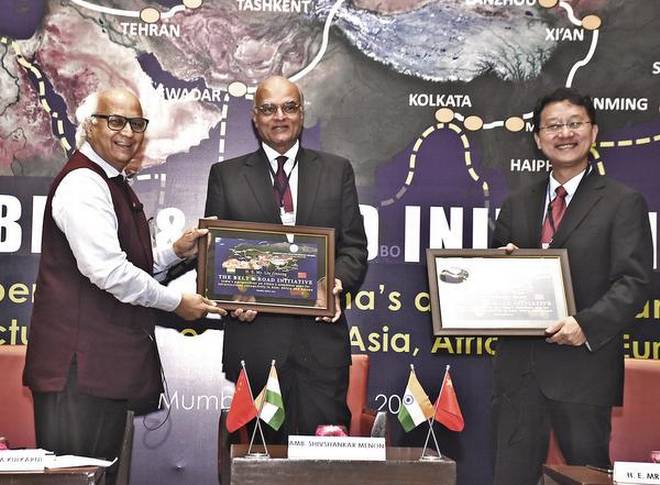
All smiles: (From left) Sudheendra Kulkarni, Shivshankar Menon and Liu Jinsong at the seminar in Mumbai on Friday.
All smiles: (From left) Sudheendra Kulkarni, Shivshankar Menon and Liu Jinsong at the seminar in Mumbai on Friday.
Countries should join hands for Belt & Road Initiative, say experts
Mumbai: Geopolitical concerns and uneasy relationship aside, India and China could benefit from cooperation for China’s Belt and Road Initiative (BRI), the transcontinental economic corridor, dignitaries from both countries said on Friday at a seminar in the city.
India has thus far withdrawn participation in the BRI for legitimate reasons, said Chairman of Observer Research Foundation, Sudheendra Kulkarni: One of the BRI projects passes through Pakistan-occupied Kashmir, he said, which is a key reason. However, relations between India and China should proceed with dialogue, considering the economic benefits of its participation, he said.
Shivshankar Menon, diplomat and former national security advisor to the Prime Minister, said, “The economic logic of transcontinental-scale connectivity is strong, especially in today’s world in which countries are getting isolated from each other, with the economic nationalism of the West and the U.S. It would also help to address the large infrastructure gap in Asia, which the Asian Development Bank estimates to amount to USD 1.7 trillion.”
Announced in 2013, the BRI aims to create a corridor linking Asia, Europe and Africa, both on land and sea. A conference, the Belt and Road Forum for International Cooperation, is set to be held in May in Beijing with the participation of 56 countries.
Uneasy, brittle peace with China might prevent Indian participation in the BRI, said Pradeep Chauhan, retired Vice Admiral of the Indian Navy: uneasy because they haven’t settled their borders with each other, and brittle because of their economic competition. “China accounts for 45% of today’s global oil demand, and it uses maritime trade links to achieve this worldwide. For example, in April 2016, Maldives offered its Gaadhoo Island to China for port development; we also see Chinese investment in Hambantota Port. India is also establishing trade links: NSTC (the North-South Trade Corridor), Project Mausam, and SAGAR (Security and Growth for All in the Region). People think of India’s participation in the BRI as a zero-sum game — if India joins, it is great, if not, it is bad. But in reality India and China have competing connectivity networks that might prevent India from wanting to participate in a Chinese connectivity project,” he said.
Minister in the Embassy of the People’s Republic of China in New Delhi, Liu Jinsong, said India’s participation in the BRI is crucial. “The project benefits global economic and political cooperation. It might have been initiated by China but it will not be dominated by China. India’s concerns over the BRI, including those about its sovereignty as a country, can be resolved. China is willing to discuss problems with India on the basis of mutual benefit,” he said. As an example of successful discussion, India should look at the BCIM (Bangladesh, China, India, Myanmar) Corridor which it has reached consensus on, and discussions on which will happen end-April in Kolkata.
Zheng Bin, Chief Executive Officer, India, of Industrial and Commercial Bank of China and Chairman of Mumbai Chinese Enterprises Association, said he cannot deny geopolitical concerns, but India and China should allow them to matter as little as possible.
“India and China are the leading economies of the world. As a businessman, I see dozens of benefits to the BRI, and very few pitfalls.” He also referenced the principle of peaceful co-existence stated in the five principles of the Panchsheel Pact, signed between India and China in 1954, also brought up by other speakers at the seminar.
Chief economist at Aditya Birla Group, Ajit Ranade, spoke of the crux of the debate. “Thorny issues notwithstanding, India and China are on par in terms of purchasing power parity and cannot envisage non-engagement,” he said. The lack of trust India has for China dates back to post-colonial nation-state forming, said former Ambassador of Bangladesh to India, Tariq Karim.“Since then, the two-nation theory, majoritarian jingoism, and border tension all make it difficult to look past borders,” he said. However, said Mr. Kulkarni, neither country would benefit from a stand-off.
“Existence of differences does not, and should not, mean the end of the road for cooperation. Throughout history, dialogue based on mutual trust and respect has built roads of understanding. When potential benefits far outweigh real or imagined problems, the case for cooperation becomes compelling,” he said.

